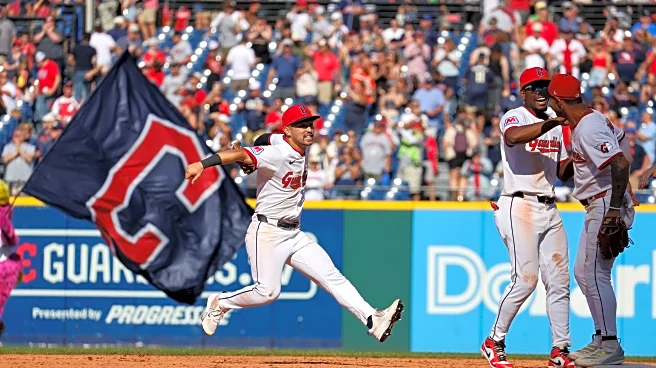Ok, first, the standings:

Now, the remaining schedules:
Boston Red Sox: 3 at Blue Jays, 3 vs. Tigers
Detroit Tigers: 3 at Guardians, 3 at Red Sox
Cleveland Guardians: 3 vs. Tigers, 3 vs. Rangers
Houston Astros:
3 at A’s, 3 at Angels
And finally, the thing we seem to talk about more than anything else these days, the percentage odds to make the MLB playoffs (as per FanGraphs):
Boston Red Sox: 90.1%
Detroit Tigers: 85.2%
Cleveland Guardians: 59.5%
Houston Astros: 65.3%
So to wrap things up here: the Red Sox, Tigers, Guardians, and Astros are four teams fighting for three postseason spots. One of those four teams definitely will not make the playoffs. And yet, according the percentage odds, each one of them is likely to make the playoffs.
If it seems weird to spend so much time talking about percentage odds when translating percentage odds into common language results in apparent contradictions, I agree. And it leads me to one inescapable conclusion: looking at and talking about playoff percentage odds (or even worse, the in-game win probability odds we see so much these days on broadcasts) is a waste of time and mind-numbingly dumb.
I’m sure there are plenty of people out there (like Bryan Joiner’s old college buddy) who will be more than happy to tell me why I am the idiot for thinking that this is an incredibly stupid way to think about sports. They will point out the broad misunderstandings of statistics throughout society; they will use the word fallacy a lot; they will come up with elaborate analogies to make my big dumb head understand what these probabilities really mean. Here, I’ll do it myself:
Imagine there’s a Looney Tunes-style boulder rolling inexorably down the hill towards four people. There’s a cave on the side of the hill with exactly enough space for three people and no more. One of those four people will definitely not make it into the cave and will be totally flattened by the boulder, sticking to it like a piece of gum as it keeps rolling down the hill before it finally crashes into a mousetrap factory. But since 75% of the people will make it into the cave and escape that fate, it’s reasonable for each of those four people to believe and know that they are likely to be safe, even if they also know that one of them definitely will not be.
I understand this. I really do. So back off, Bryan Joiner’s old college buddy. But what bothers me here is a broader question: why do we care what the playoff percentage odds say, anyway? Why don’t we just watch the games? When it comes to sports, in which anything can happen, why are we so fixated on what should happen?
This is probably a topic that deserves a much deeper explanation, including interviews with psychologists and deep dives into academic studies, but one thing about modern sports consumption seems clear to me: the actual games as they are played on the field have never been less important to the way we think about, talk about, and consume sports.
This trend has been observed for a while now. It’s long been a cliche to say that NBA free agency is more exciting than the NBA regular season. In global soccer, transfer rumors thoroughly dominate the news cycle, even after the season has started. And in baseball, there are large swaths of fans and media members who are far more interested in long-term team-building strategies and front office philosophies than anything that happens on the field. In fact, the randomness that is inherent to baseball often leads people to dismiss the results of the games altogether, as if they tell lesser truths than the truths we observe when we grade a front office’s offseason or trade deadline performance. The games are secondary at best, or, even worse, a total distraction.
Why are we doing this?
There are likely a number of different factors that have contributed to this dynamic. In a demographic and experiential sense, fans and media members are increasingly likely to relate more to front office personnel than to the superhuman players themselves. We haven’t thrown a baseball since little league, which makes it hard to truly appreciate Payton Tolle’s fastball. But we do a dynasty auction every March, so we sure as hell appreciate the importance of cap space. Meanwhile, the omnipresence of gambling has turned us all into prognosticators. For most of my life I had no idea what that +100 listed next to a baseball team meant and that was fine with me. But sports gambling has birthed a language all its own and now we’re all fluent in it, whether we like it or not.
But I think there’s something else going on here that more directly relates to the reason why we seem to talk way more about how the playoff percentage odds have moved every morning than we do about the action on the field that caused that movement: I think we’re all scared, and I think we all yearn for some goddamn certainty in our lives.
The world that we live in increasingly appears to be a chaotic, broken place where nothing makes sense. Our traditional notions of cause-and-effect seem to have been smashed to bits. And even if the world has always been a cauldron of chaos to some extent, we now have super-computers in our pockets that allow us to monitor the chaos on a minute-by-minute basis. The world is a rapidly spinning gyre and we just want something to hold onto.
This is where the playoff percentages come into play. We desperately need and want to know what should happen. The idea that anything can happen, while supposedly central to the joy of sports, is fraught and hard to wrap our heads around, so we pretend that it is simply not true. We see Tarik Skubal on the mound against the Guardians and say okay, there’s one they’ll finally lose, here’s the Sox’ chance to increase their lead. We see Kyle Harrison on the mound in front of a lineup that features Masataka Yoshida hitting cleanup and we say okay, we’re definitely not winning this one, so the lead is effectively gone already. Then the baseball gods laugh in our face.
Sports, remember, are not supposed to provide certainty. Quite the opposite, in fact. Watching a baseball game is supposed to be fun precisely because we don’t know what’s going to happen, while understanding that anything can. In sports, it doesn’t matter what “should have happened,” all that matters is what actually does.
There are six games left in the Major League Baseball season. We know that the Red Sox, Tigers, and Astros are closer to securing a playoff spot than the Guardians. We also know that those three teams will actually have to win some baseball games to do that. Those games are supposed to be the fun part, and any probabilities attached to them are pointless once the first pitch is thrown.
Watch the games, have fun, and forget about the numbers. The word is scary and chaotic, but the type of chaos that baseball provides is the good kind. Embrace it.










